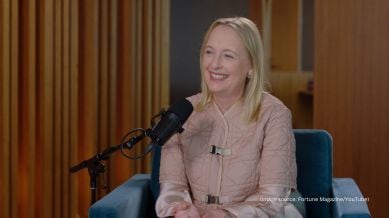Accenture CEO Julie Sweet on what will separate AI winners from losers: ‘It isn’t about using AI on top of what you do today’
Sweet stressed that CEOs shouldn’t approve projects unless they can clearly see how it connects to the bottom line.

Accenture CEO Julie Sweet believes the era of dabbling in AI is over. From now, it’s about proving results. Speaking on Fortune 500: Titans and Disruptions of Industry with Fortune’s editor-in-chief Alyson Shontell, she was direct: “One word, reinvention. This isn’t about using AI on top of what you do today. If you’re not significantly changing the way you operate, then you’re not reinventing, and you’re not going to capture the value.”
For Sweet, CEOs should only back projects that clearly connect to the bottom line. At Accenture, she noted, generative AI has already cut the time it takes to move from idea to market by 90 per cent.
Leadership in this era, she added, also demands humility. “Humility is what allows you to be a learner. It helps you build great teams, and it allows you to see what you’ve done and how you led the company.” That mindset, she argued, matters more than apocalyptic predictions about mass corporate failures. Contrary to forecasts like Vinod Khosla’s warning that many Fortune 500 companies could collapse in the 2030s, she sees today’s CEOs leaning into AI as a growth engine rather than a threat.
Watch the video:
Sweet also reflected on a turning point in her own career. In 2014, just before she was diagnosed with breast cancer, she ended a meeting with then-CEO Pierre Nanterme, who surprised her by saying: “I think you could run this place someday.” At the time, she was Accenture’s general counsel, coming from a legal background rather than a traditional business track record, and no woman had ever led the company before.
Instead of doubting herself, Sweet drew on advice from former JPMorgan Chase CFO Dina Dublon: when offered a stretch role, don’t undermine their belief in you by asking, “Are you sure?” Accept with confidence. Sweet did exactly that. Her response—“Yes, I’d be interested. What did you have in mind?”—set her on a new trajectory, leading North America in 2015 and ultimately becoming CEO in 2019.